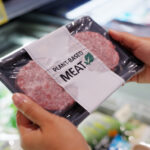Is the FAKE MEAT industry part of the globalist agenda?
 (NaturalHealth365) As former Big Food insiders warn that the global food system is rigged in favor of corporate interests (and at the expense of human health and well-being), we as consumers continue to see risks associated with ultra-processed foods that are available virtually everywhere in our Westernized culture.
(NaturalHealth365) As former Big Food insiders warn that the global food system is rigged in favor of corporate interests (and at the expense of human health and well-being), we as consumers continue to see risks associated with ultra-processed foods that are available virtually everywhere in our Westernized culture.
Take the fake meat industry as just one example. The hype about ultra-processed, plant-based meat à la “Impossible Burgers” has been deemed underwhelming by the market – earlier this year, the financial and media powerhouse Bloomberg called the fake meat movement a “flop.” But that hasn’t stopped companies from trying to squeeze even more out of the plant-based movement – and some experts worry that this is jeopardizing the integrity of our global food system.
We’re being force-fed the idea that fake meats are better for health and environment – but is there more to the story?
Here’s the thing: we lack sufficient long-term data about the health impacts of fake and lab-grown meat products.
However, industry insiders and even some dietitians continue to tout the message that plant-based and manmade “animal” products are overwhelmingly environmentally-friendly, sustainable, and better for human health.
As an example, we often hear the claim that meatless Impossible Burgers have the same amount of protein as 80% lean beef as well as several important nutrients – all while being a versatile, vegan-friendly, and gluten-free option.
However, these meatless burgers are made with genetically modified ingredients, contain common food allergens, and are made with a manmade compound known as soy leghemoglobin, of which there is no long-term safety data. (As of now, the compound is only Generally Recognized as Safe (GRAS) by the Food and Drug Administration and mostly has short-term animal studies behind it supporting its “safety.”)
Plus, the actual sustainability of plant-based meats is not conclusive, especially when compared to regenerative farming and animal-rearing practices, according to some research.
The safety of lab-created meats is even less clear. The current method to make lab-grown meat involves the use of animal cells “grown in a solution of fetal bovine serum or other growth mediums.”
Health experts concerned with the potential adverse health effects of fake meat consumption point out that companies often have to use “immortalized cells, i.e., precancerous and/or cancerous animal cells” in order to actually ensure these cells can replicate enough times to create the fake meat product. Although promoters of the fake meat movement often claim there’s no risk to eating these cells, no long-term studies substantiate this assumption.
Worry grows over lab-grown meats: a sneaky way for corporations to control the world’s food supply?
There’s more to the story than just the health concerns, however. Many are worried that the rise of fake meat is nothing more than an attempt to create global control over another food sector. Big Food conglomerates like Monsanto are poised to achieve “global control” over the food market through the increasingly widespread use of “patented GMO seed development.”
The ultimate question, of course, is this:
Are any potential “benefits” of fake or even lab-grown meat worth the known and unknown risks? And for that matter, why are people being sold this idea that you have to eat “fake meat” in order to enjoy a vegan or vegetarian lifestyle? Why not just forgo the fake meats altogether?
And as for those who choose to include meat in their diet but are concerned about the potential environmental and health impacts, why not simply follow the creed to “eat less and eat better” instead of introducing more ultra-processed things to their diet?
Obviously, these are all highly personal decisions that individual consumers have a right to make for themselves and their families. But if the market continues to become monopolized by a few powerful, international Big Food and Big Agra powerhouses, how much freedom of decision will we really retain?
Sources for this article include:
Bloomberg.com
Childrenshealthdefense.org
Healthline.com
Impossiblefoods.com



